From History's Golden Chapter
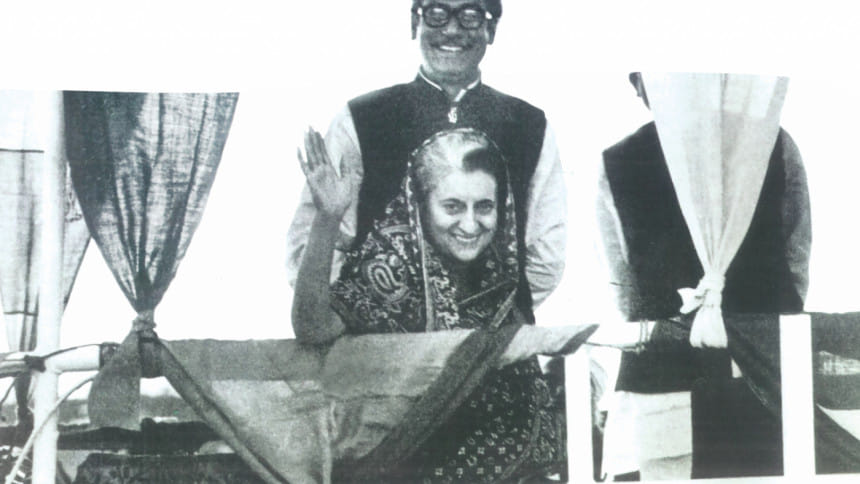
It was a shivering cold morning on January 10, 1972. Braving the chill, thousands lined the eight-mile route from Delhi's Parade Ground to Rashtrapati Bhaban.
They cheered Bangabandhu Sheikh Mujibur Rahman as the motorcade carrying him, accompanied by Indian leaders, headed for the presidential residence from the Parade Ground. A low flying plane showered them with rose petals.
At the Parade Ground, where he addressed a public meeting, people milled around to get a closer, better look at him. And when he entered the six-door Mercedes Benz which was to take him to Rashtrapati Bhaban, the wildly cheering crowd almost surrounded the car in a vain attempt to shake his hand.
Delhi had prepared overnight to welcome Bangabandhu. Floral arches were set up on roads at several places from the Parade Ground to Rashtrapati Bhaban. Banners reading "Long live the Creator of Bangladesh" and “Long live the Liberator of Bangladesh" fluttered.
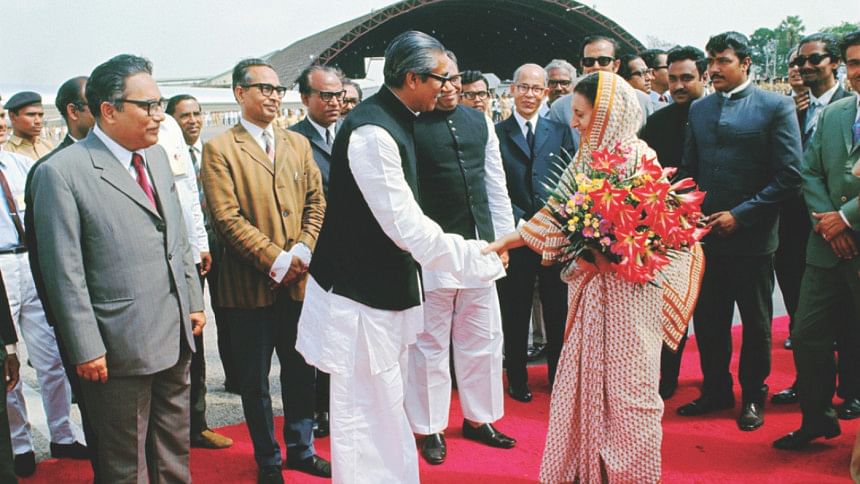
The arches were decorated with potted plants and with portraits of Bangabandhu, president of newly born Bangladesh. Along the roads, some iron frames covered with leaves had also been erected.
On that historic morning, Indian President VV Giri, Prime Minister Indira Gandhi, many other dignitaries and diplomats of more than 20 foreign countries waited at Delhi's Palam Airport to receive Bangabandhu, who was flying in from London on his way to a free Bangladesh after his release from nine months of solitary confinement in Pakistan's Mianwali jail in West Punjab.
As he came down the gangway of the British Royal Air Force plane that brought him from London, he was welcomed with garlands of marigolds by Indira Gandhi, President Giri and other Indian dignitaries. A 21-gun salute heralded his arrival in the Indian capital.
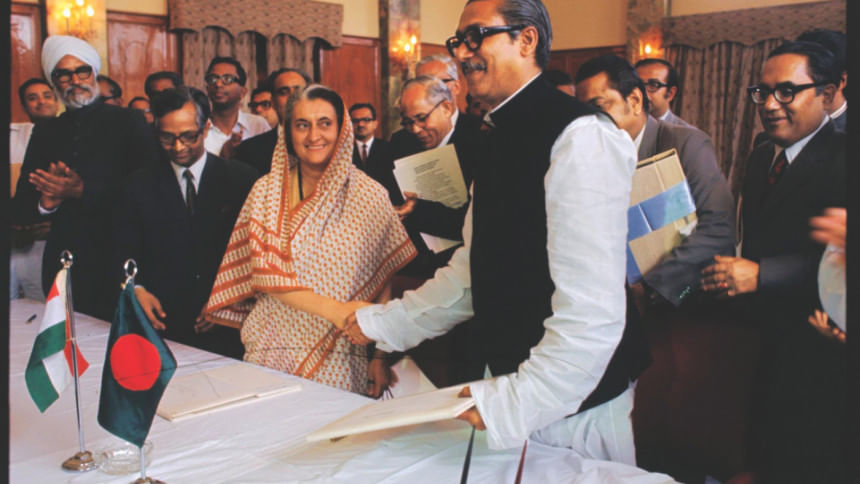
After an exchange of greetings, the president of Bangladesh inspected a guard of honour presented to him by the three services -- army, navy and air force. Then he moved to the VIP pandal at the Parade Ground where he was showered with marigold petals.
The national anthem of Bangladesh, “Amar Sonar Bangla”, was played the moment he took his place on the saluting base. It was followed by the Indian national anthem, “Jana Gana Mana”. Both the anthems, it may be noted, were penned by Rabindranath Tagore. The flags of the two countries flanking the pandal fluttered in the breeze.
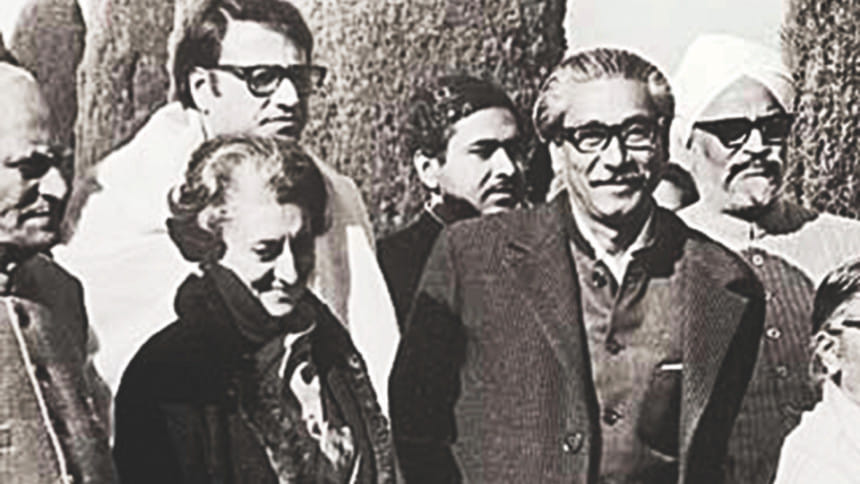
Before Bangabandhu, Indira Gandhi addressed the crowd. She was aware of the pulse of the crowd. She made a brief statement welcoming Bangabandhu.
In her speech, she said Sheikh Mujibur Rahman had promised freedom to his people and had given it to them. India had taken a pledge to free Bangladesh, free Mujib and finally send the refugees to their homes.
Waves of applause greeted Bangabandhu as he rose to address the mammoth gathering. He began his speech in English. But when the crowd clamoured for him to speak in Bengali, a happy Bangabandhu switched to his mother tongue. The crowd roared its approval.

PROSPECT OF GENUINE FRIENDSHIP
In his address, Bangabandhu repeatedly spoke of the unity of feelings between the peoples of Bangladesh and India in their ideals and beliefs. He hoped that Bangladesh would prosper amid undying friendship between the two countries.
He told the cheering Indians on that cold morning that Bangladesh and India would be bound in eternal friendship.
In a voice charged with emotion, he told the huge gathering, "Bangladesh and its people will never forget your Prime Minister, your government and your brave armed forces and your common people who have extended all sympathies and support to their sufferings and struggle.”
Earlier VV Giri, in his welcome speech at Palam Airport, said: "It gives me great joy and pleasure to welcome Bangabandhu Sheikh Mujibur Rahman to our country."
"Our two countries, India and Bangladesh, are bound in firm friendship and both nations are dedicated to the principles of democracy, secularism and socialism."
Following his address in Delhi, Bangabandhu flew home.
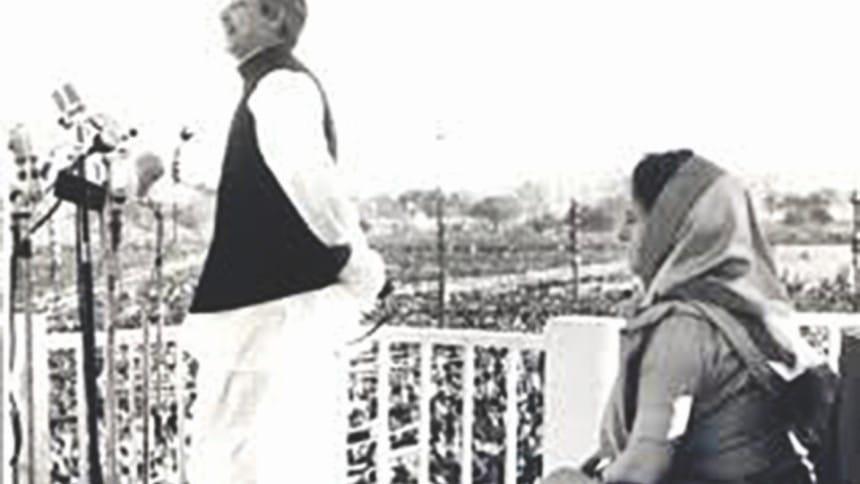
At his first press conference in independent Bangladesh on January 14, Bangabandhu, who had assumed the office of prime minister on January 12, reiterated that the friendship of Bangladesh for India was “in our hearts”.
"We have a very special relationship. The relationship is the friendliest. Our treaty of 'friendship' is in our hearts,” he said in response to a query whether there would be a special treaty between India and Bangladesh. He illustrated his remarks by pointing to his heart.
At the invitation of the Indian government, Bangabandhu visited Calcutta from February 6 to 8, 1972. He was welcomed by Indira Gandhi.
During his stay, he addressed a huge gathering in Calcutta, thanking them for their assistance and cooperation with Bangladesh's people during the War of Liberation.
At their talks, the two prime ministers discussed bilateral issues and various aspects of mutual relations between their two countries.
In a joint statement issued by them they “expressed their determination to promote, in every possible way, cooperation between the governments and peoples of Bangladesh and India inspired by a vision of lasting peace, amity and good neighborliness.”
They decided that the representatives of the two countries' planning commissions would meet periodically to identity areas of mutual co-operation in the development process of the two countries.
They agreed to remain in close touch to review the international situation and the dangers to peace, stability and progress in region.
At the invitation of the Bangladesh government, Prime Minister Indira Gandhi visited Dhaka in March 1972. She addressed a public rally on March 17 in Dhaka. Incidentally, the day happened to be Bangabandhu's birthday. In her speech, she reiterated the spirit of friendship and development between the two countries.
“I trust that, in the coming years, friendship between our two countries will be built not on the basis of that assistance that we might have given to you now but on the basis of full equality and mutual benefit of two free and sovereign nations."
'We hope that whosoever is in difficulty, whether from poverty or injustice, the peoples of Bangladesh and India will fight together against injustice and tyranny,' she asserted.
"It is in the Indian interest that Bangladesh should be free and strong. If we offer you cooperation, it is not out of any desire to wield influence over you. We want you to stand on your feet," Mrs Gandhi told the exultant crowd.
A joint declaration issued by the two prime ministers on March 19 expressed the conviction that the bonds of fraternity and friendship forged during the freedom struggle of Bangladesh and cemented by the sacrifices made by the peoples of both the countries would continue to grow and become a vital factor in strengthening the forces of peace and progress in Asia and the world.
During the Indian leader's visit, the two leaders signed the historic treaty of friendship, cooperation and peace between India and Bangladesh.
The next day, March 20, Indira Gandhi in a statement before the Indian parliament spoke about the treaty.
"I should like to emphasise that the Treaty embodies the will of the two governments to pursue common policies in matters of interest to both countries and solemnizes the close ties of friendship between our two countries and peoples cemented through blood and sacrifice."
"The treaty and declaration will guide us on our journey into the future in quest of peace, good neighborliness and the well being of our two peoples."
As he analyses the beginning of the friendship between two countries, Prof Ahrar Ahmad says after the emergence of Bangladesh in 1971 the two countries behaved like long lost brothers finally able to embrace each other in the fullness of joy.
"The prospect of friendship between the two countries, expressed in rhetoric and policy, was genuine and rosy," writes political scientist Ahrar, who is involved with Black Hills State University in South Dakota, in an article.
"But the situation changed dramatically in about two years," he writes in the book, "Political Culture in Bangladesh", on the Bangladesh-India relationship.
The remaining story portrays a picture which does not match with the beginning of relations between the two countries in 1972.
That dawn of friendship seems to have turned into a forgotten chapter of history, as subsequent developments in ties between the two countries would show.
[The article was prepared on the basis of reports in the compilation, "Bangladesh Documents", and the book, “Political Culture in Bangladesh”, the latter edited by Syed Saad Andaleeb.]

 For all latest news, follow The Daily Star's Google News channel.
For all latest news, follow The Daily Star's Google News channel. 



Comments